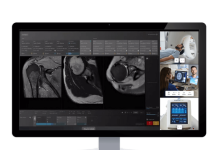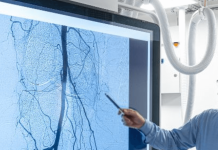Masimo SpHb Demonstrated “Clinically Acceptable Accuracy” of Hemoglobin Measurement, Even at Low Hemoglobin Levels
Masimo (NASDAQ: MASI) announced the findings of a prospective study published in the Egyptian Journal of Anesthesia in which Dr. Mohamed Ibrahim Beleta and colleagues at Cairo University evaluated the accuracy of noninvasive, continuous hemoglobin monitoring with Masimo SpHb® on patients undergoing elective cesearan section (CS) with antepartum hemorrhage. The researchers found significant positive correlations between SpHb and invasive hemoglobin (Hb) values, and concluded, “In patients undergoing CS with antepartum hemorrhage, continuous SpHb through Masimo Pulse CO-Oximetry demonstrated clinically acceptable accuracy of Hb measurement compared with invasive Hb, even at low hemoglobin levels.”1
“In patients undergoing CS with antepartum hemorrhage, continuous SpHb through Masimo Pulse CO-Oximetry demonstrated clinically acceptable accuracy of Hb measurement compared with invasive Hb, even at low hemoglobin levels.”Tweet this
The authors note that antepartum hemorrhage is associated with adverse maternal and neonatal outcomes and that blood transfusion is also associated with a variety of risks, but that invasive laboratory hemoglobin measurement, while a crucial factor in transfusion decisions, yields intermittent and often delayed results. The researchers thus sought to evaluate whether use of noninvasive, continuous hemoglobin monitoring might “enable a more rapid detection of clinically significant blood loss, improve perioperative transfusion practices, allow patient condition to be assessed more quickly and blood management more adequately, and perhaps even reduce needless transfusions.” They enrolled 60 pregnant women, aged 18-45, scheduled for elective CS under general anesthesia between April 2016 and December 2017. All subjects had antepartum hemorrhage and were candidates for blood transfusion. During the procedure, all patients were monitored as per hospital standards, and in addition, with Masimo SpHb. All blood samples (Lab Hb) were analyzed using the same Coulter laboratory analyzer to avoid variance induced by the use of multiple devices. Lab Hb and SpHb values were recorded before induction of anesthesia (baseline), before transfusion, and after transfusion. Blood transfusion was carried out when Lab Hb decreased by more than 20% from baseline.

The researchers found significant positive correlations between SpHb and invasive Hb at the three points of comparison: baseline (r = 0.946), pre-transfusion (r = 0.902), and post-transfusion (r = 0.698). Differences at those times were insignificant: p = 0.196, p = 0.092, and p = 0.570, respectively. Using Bland-Altman analysis, they found low bias and moderate limits of agreement: 0.348 g/dL (-0.584 and 1.280) at baseline measurement, 0.314 g/dL (-0.561 and 1.188) at pre-transfusion, and 0.348 g/dL (-0.584 and 1.280) at post-transfusion.
The investigators concluded, “Continuous SpHb Masimo Pulse CO-Oximetry shows an appropriate clinically reliable Hb calculation in comparison to Invasive Hb even in patients undergoing CS with low hemoglobin. Further studies are needed on larger sample size with multicenter collaboration. Furthermore, we recommend the assessment of this technique on patients with common morbidities, such as high cholesterol, high blood pressure, and diabetes.”
The researchers also noted that “SpHb evaluation has the potential for additional benefits, including patient comfort, increased safety, and decreased complexity for healthcare staff, who are not exposed to the risks of needle-stick injury and bloodspill contamination.”
SpHb is not intended to replace laboratory blood testing. Clinical decisions regarding red blood cell transfusions should be based on the clinician’s judgment considering, among other factors, patient condition, continuous SpHb monitoring, and laboratory diagnostic tests using blood samples.
About Masimo
Masimo (NASDAQ: MASI) is a global medical technology company that develops and produces a wide array of industry-leading monitoring technologies, including innovative measurements, sensors, patient monitors, and automation and connectivity solutions. In addition, Masimo Consumer Audio is home to eight legendary audio brands, including Bowers & Wilkins, Denon, Marantz, and Polk Audio. Our mission is to improve life, improve patient outcomes, and reduce the cost of care. Masimo SET® Measure-through Motion and Low Perfusion™ pulse oximetry, introduced in 1995, has been shown in over 100 independent and objective studies to outperform other pulse oximetry technologies.2 Masimo SET® has also been shown to help clinicians reduce severe retinopathy of prematurity in neonates,3 improve CCHD screening in newborns,4 and, when used for continuous monitoring with Masimo Patient SafetyNet™ in post-surgical wards, reduce rapid response team activations, ICU transfers, and costs.5-8 Masimo SET® is estimated to be used on more than 200 million patients in leading hospitals and other healthcare settings around the world,9 and is the primary pulse oximetry at 9 of the top 10 hospitals as ranked in the 2022-23 U.S. News and World Report Best Hospitals Honor Roll.10 In 2005, Masimo introduced rainbow® Pulse CO-Oximetry technology, allowing noninvasive and continuous monitoring of blood constituents that previously could only be measured invasively, including total hemoglobin (SpHb®), oxygen content (SpOC™), carboxyhemoglobin (SpCO®), methemoglobin (SpMet®), Pleth Variability Index (PVi®), RPVi™ (rainbow® PVi), and Oxygen Reserve Index (ORi™). In 2013, Masimo introduced the Root® Patient Monitoring and Connectivity Platform, built from the ground up to be as flexible and expandable as possible to facilitate the addition of other Masimo and third-party monitoring technologies; key Masimo additions include Next Generation SedLine® Brain Function Monitoring, O3® Regional Oximetry, and ISA™ Capnography with NomoLine® sampling lines. Masimo’s family of continuous and spot-check monitoring Pulse CO-Oximeters® includes devices designed for use in a variety of clinical and non-clinical scenarios, including tetherless, wearable technology, such as Radius-7®, Radius PPG®, and Radius VSM™, portable devices like Rad-67®, fingertip pulse oximeters like MightySat® Rx, and devices available for use both in the hospital and at home, such as Rad-97®. Masimo hospital and home automation and connectivity solutions are centered around the Masimo Hospital Automation™ platform, and include Iris® Gateway, iSirona™, Patient SafetyNet, Replica®, Halo ION®, UniView®, UniView :60™, and Masimo SafetyNet®. Its growing portfolio of health and wellness solutions includes Radius Tº® and the Masimo W1™ watch. Additional information about Masimo and its products may be found at www.masimo.com. Published clinical studies on Masimo products can be found at www.masimo.com/evidence/featured-studies/feature/.
ORi, RPVi, and Radius VSM have not received FDA 510(k) clearance and are not available for sale in the United States. The use of the trademark Patient SafetyNet is under license from University HealthSystem Consortium.
Are you Hiring?




